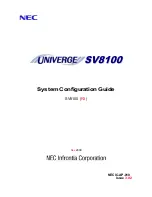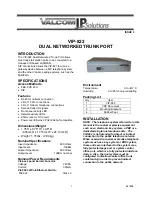
Chapter 9
233
Configuring Passthrough Services
Configuring DLUR
Configuring DLUR
Normally, a dependent LU session requires a direct communications link
to the host computer. If many nodes (including a host node) are
connected together in an APPN network, some of them may have an
indirect connection through another node instead of a direct connection
to the host. Without a direct connection, it is not possible to establish
dependent LU sessions to the host from LUs in these indirectly
connected nodes.
Dependent LU requester (DLUR) is an APPN feature designed to
overcome this limitation. DLUR can be configured on an APPN node
(such as a node running SNAplus2). It works in conjunction with
dependent LU server (DLUS) at the host, to route sessions from
dependent LUs on the DLUR node across the APPN network to the
DLUS host.
The route to the host can span multiple nodes and can take advantage of
APPN's network management, dynamic resource location, and route
calculation facilities. DLUR must be available on the node where the
LUs are defined, and DLUS must be available on the host node, but you
do not have to enable DLUR on any intermediate nodes in the session
route.
NOTE
You cannot configure DLUR on a LEN node.
To configure DLUR support on the local node, you must perform the
following configuration tasks:
Step 1. Define the local node as described in “Configuring the Node”.
Step 2. Configure connectivity to the APPN network. APPN connectivity
requires at least a port and link station for independent traffic between
the local node and the adjacent APPN network node, as described in
Chapter 5, “Defining Connectivity Components.”
Step 3. Define a DLUR PU on the local node as described in “Defining DLUR
PUs”. (The DLUR PU supports connectivity to the host.)
Step 4. To configure DLUR to support LUs on the local node, you must add the
LUs on the local node, as described in Chapter 8, “Configuring User
Applications.”. The LUs can be configured to support 3270 display, 3270
Summary of Contents for HP-UX SNAplus2
Page 4: ...4 ...
Page 14: ...14 Contents ...
Page 22: ...22 ...
Page 23: ...23 1 SNA Terms and Concepts ...
Page 65: ...65 2 Introduction to SNAplus2 ...
Page 107: ...107 3 Administering SNAplus2 ...
Page 132: ...132 Chapter3 Administering SNAplus2 Using the Command Line Administration Program ...
Page 133: ...133 4 Basic Configuration Tasks ...
Page 142: ...142 Chapter4 Basic Configuration Tasks Configuring Logging ...
Page 143: ...143 5 Defining Connectivity Components ...
Page 167: ...167 6 Configuring Dependent LUs ...
Page 174: ...174 Chapter6 Configuring Dependent LUs Defining LU Pools ...
Page 175: ...175 7 Configuring APPC Communication ...
Page 208: ...208 Chapter7 Configuring APPC Communication Configuring APPC Security ...
Page 209: ...209 8 Configuring User Applications ...
Page 222: ...222 Chapter8 Configuring User Applications Configuring RJE Workstations ...
Page 223: ...223 9 Configuring Passthrough Services ...
Page 235: ...235 10 Managing SNAplus2 from NetView ...
Page 248: ...248 Chapter10 Managing SNAplus2 from NetView Using UCF ...
Page 249: ...249 11 Managing SNAplus2 Clients ...
Page 300: ...300 Chapter11 Managing SNAplus2 Clients Managing HP UX Clients ...
Page 301: ...301 A Configuration Planning Worksheets ...
Page 337: ...337 B APPN Network Management Using the Simple Network Management Protocol ...
Page 343: ...343 C Configuring an Invokable TP Using snaptpinstall ...
Page 353: ...353 D Using SNAplus2 in a High Availability Environment ...
















































